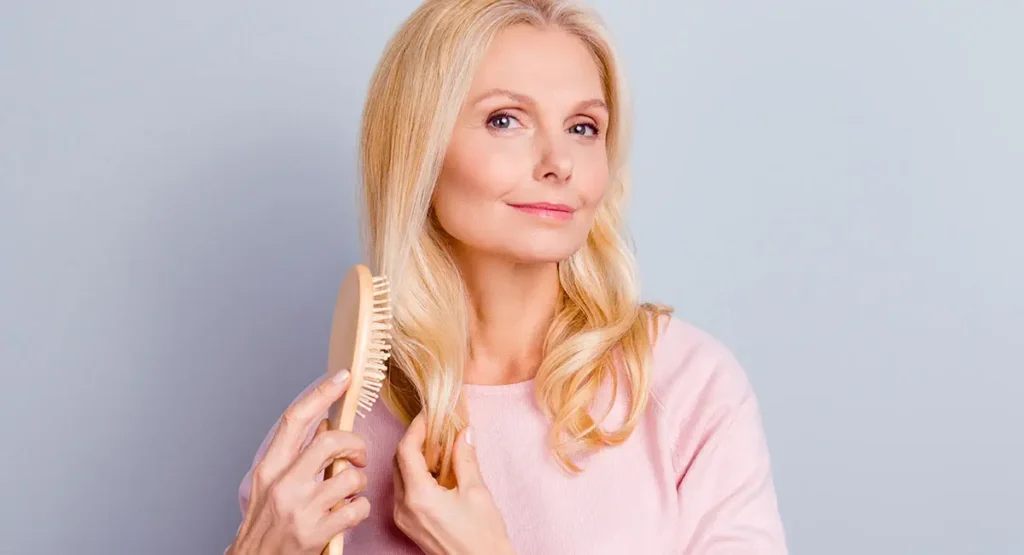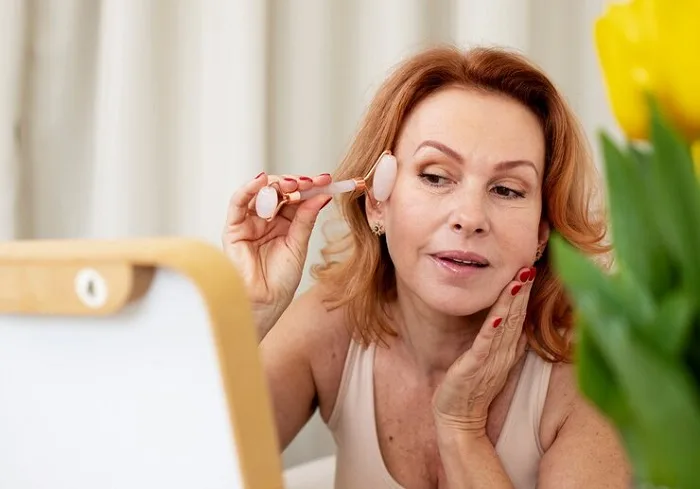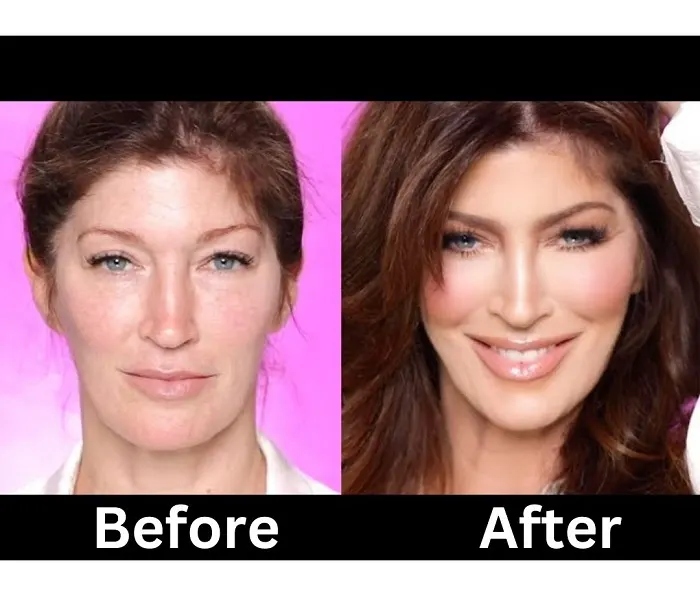Turning 50 is a milestone that brings a new chapter in beauty, where wisdom meets elegance. Your skin, hair, and style may evolve, but with the right care, you can continue to glow with confidence.
In this article discover beauty tips for women at age 50Embrace natural beauty and how to enhance it with age-appropriate tips that celebrate the woman you’ve become.
Changes Occur In Women’s Beauty After 50s
Skin Changes
- Skin loses collagen and elastin, leading to sagging and the formation of wrinkles and fine lines.
- Oil production decreases, causing skin to become drier and more prone to irritation
- Sun exposure over the years can result in age spots, also known as liver spots, and uneven pigmentation.
- The skin may become thinner and more fragile, making it more susceptible to bruises and cuts.

Hair Changes
- Hormonal changes, particularly the decrease in estrogen, can lead to thinning hair or increased hair loss.
- Melanin production decreases, causing hair to lose its natural color and turn gray or white.
- Hair may become drier, coarser, or more brittle, and may require different care and styling techniques.
Body Changes
- Muscle mass tends to decrease with age, leading to a reduction in strength and a higher risk of falls.
- A slower metabolism can make it easier to gain weight, particularly around the abdomen.
- Women may experience a loss of bone density, increasing the risk of osteoporosis and fractures.
- Fat may accumulate in different areas, such as the waist and hips, due to hormonal changes.

Essential Skincare Habits To Develop at 50s and Above
Gentle Cleansing
- As skin ages, it becomes more delicate and prone to dryness. Using a harsh cleanser can strip the skin of its natural oils, leading to irritation and further dryness.
- Choose a gentle, hydrating cleanser that effectively removes dirt, makeup, and impurities without disrupting the skin’s natural barrier. Look for cleansers with soothing ingredients like aloe vera, chamomile, or glycerin.
Regular Exfoliation
- Exfoliation helps remove dead skin cells that can accumulate on the skin’s surface, making it look dull and uneven. Regular exfoliation promotes cell turnover, which can help reduce the appearance of fine lines and reveal brighter, smoother skin.
- Exfoliate 1-2 times a week with a gentle scrub or a chemical exfoliant containing alpha-hydroxy acids (AHAs) like glycolic acid or lactic acid. Be careful not to over-exfoliate, as this can cause irritation.
Moisturize Deeply
- As the skin ages, it loses moisture more quickly, leading to dryness and the formation of wrinkles. A good moisturizer helps to lock in hydration and keep the skin plump and soft.
- Choose a rich, nourishing moisturizer with ingredients like hyaluronic acid, which attracts moisture to the skin, and ceramides, which help restore the skin’s natural barrier. Apply moisturizer morning and night to maintain hydration.
Incorporate Anti-Aging Serums
- Anti-aging serums are concentrated with active ingredients that target specific signs of aging, such as wrinkles, fine lines, and uneven skin tone.
- Incorporate serums with retinol (a form of vitamin A that helps reduce wrinkles), peptides (which support collagen production), and antioxidants like vitamin C (which brightens skin and fights free radical damage). Apply the serum after cleansing and before moisturizing.
Sun Protection
- Sun exposure is one of the leading causes of premature aging, leading to wrinkles, age spots, and a higher risk of skin cancer. Protecting your skin from UV rays is crucial at any age, but especially as you get older.
- Apply a broad-spectrum sunscreen with at least SPF 30 every day, regardless of the weather. Reapply every two hours if you’re outside, and consider wearing a hat and sunglasses for added protection.
Hydrating
- Hydration is key to keeping skin looking plump and healthy. Dehydration can make the skin appear dull and accentuate wrinkles.
- Drink plenty of water throughout the day to keep your skin hydrated from the inside out. Eating water-rich foods like fruits and vegetables can also contribute to your hydration levels.
Use Eye Cream
- The skin around the eyes is thinner and more delicate than the rest of the face, making it more prone to wrinkles, puffiness, and dark circles.
- Apply a specialized eye cream morning and night to address these issues. Look for ingredients like hyaluronic acid, peptides, and caffeine, which can help reduce puffiness and smooth out fine lines.
Night Time Skincare Routine
- Your skin repairs and regenerates itself while you sleep, making nighttime the perfect time to use products that support this process.
- Use a richer, more reparative moisturizer or a night cream with ingredients like retinol or peptides before bed. These products help to boost collagen production, repair damage, and improve skin texture overnight.
Healthy Diet
- What you eat has a direct impact on your skin’s health. A diet rich in vitamins, minerals, and antioxidants can help protect the skin from damage and promote a healthy, youthful appearance.
- Incorporate foods high in antioxidants (like berries, leafy greens, and nuts), healthy fats (such as avocados and olive oil), and vitamins A, C, and E (found in carrots, citrus fruits, and almonds). These nutrients help protect against free radical damage, support collagen production, and keep the skin hydrated.
Regular Facials and Skin Treatments
- Professional treatments can target specific skin concerns and provide a deeper level of care that complements your at-home routine.
- Consider getting regular facials to cleanse and rejuvenate the skin. Treatments like chemical peels, microdermabrasion, or laser therapy can help with exfoliation, reducing pigmentation, and promoting collagen production, leading to smoother, more youthful skin.

Effortless Makeup Tips For a Radiant Look at Age 50
- Makeup is an essential part of enhancing a woman’s beauty.
- You can use light makeup techniques daily to enhance your beauty and appear younger than your age.
Start With a Hydrating Primer
- A primer helps create a smooth base and keeps makeup from settling into fine lines.
- Choose a hydrating primer to add moisture and create a dewy finish.
Use A Tinted Moisturizer Or BB Cream
- Provides light coverage while evening out skin tone without the heaviness of foundation.
- Opt for a formula with SPF to protect your skin from sun damage.
Apply Concealer Sparingly
- Concealer helps cover blemishes and dark circles without adding extra layers.
- Use a creamy, hydrating concealer and apply it only where needed. Blend gently to avoid highlighting wrinkles.
Choose Soft Eyeshadows
- Soft eyeshadows add a subtle touch of color and brighten the eyes.
- Stick to neutral shades like taupe, beige, or soft brown. Avoid heavy or glittery eyeshadows.
Define Your Brows
- Well-defined brows frame the face and add structure.
- Use a brow pencil or powder in a shade close to your natural color to fill in sparse areas. Keep the application light and natural.
Apply A Light Blush
- Blush adds a healthy flush of color to the cheeks and gives a youthful appearance.
- Choose a cream blush in a peachy or rosy tone. Apply it to the apples of your cheeks and blend upwards.
Use A Neutral Lip Color
- A soft lip color enhances the lips without being too bold.
- Opt for a hydrating lipstick or tinted lip balm in a shade close to your natural lip color. Avoid matte formulas as they can be drying.
Lightly Set With Powder
- Setting powder helps control shine and set makeup without making the skin look dry.
- Apply a translucent powder sparingly to areas prone to oiliness, like the T-zone.
Finish With A Setting Spray
- A setting spray locks in makeup and provides a natural, dewy finish.
- Lightly mist your face with a setting spray to help makeup last longer and add a touch of radiance.
Style Your Hair And looks Younger
Here’s a detailed guide on how a woman at age 50 can take care of hair and looks great.
Regular Trims
- As hair ages, it becomes more prone to split ends and breakage. Regular trims help keep hair looking healthy and manageable.
- Schedule a trim every 6-8 weeks to remove split ends and maintain your hairstyle. This helps in preventing further damage and keeps your hair looking fresh.
Choose Gentle, Hydrating Hair Products
- Mature hair can become more fragile and prone to dryness. Using gentle, hydrating products helps maintain moisture and strength.
- Select sulfate-free shampoos and conditioners that are specifically formulated for mature hair. Look for ingredients like argan oil, keratin, and vitamin E, which nourish and strengthen the hair.
Incorporate Deep Conditioning Treatments
- Deep conditioning treatments provide intense hydration and repair to dry or brittle hair.
- Apply a deep conditioning mask or treatment once a week. Leave it on for the recommended time to allow the hair to absorb the moisture. Choose products with natural oils, such as coconut or olive oil, for added benefits.
Minimize Heat Styling
- Excessive use of heat styling tools can damage hair, making it dry and more prone to breakage.
Select Flattering Haircut
- The right haircut can enhance your features and give your hair a fuller appearance.
- Consider a haircut with layers or soft waves to add volume and movement. Consult with your stylist to find a cut that complements your face shape and works well with your hair type. Regular updates to your style can keep it fresh and modern.
Protect Hair From Environmental Damage
- Sun exposure and environmental factors can lead to color fading and dryness.
- Wear a hat or use hair products with UV filters when spending time outdoors. This protects your hair from the sun’s damaging rays and helps maintain its health and color.
Embrace Natural or Subtle Color Enhancements
- Embracing natural hair color or opting for subtle highlights can be easier to maintain and often looks more natural as hair grays.
- If you prefer coloring, consider highlights or lowlights that blend with your natural color for a softer look. Consult with your colorist to find the best option for enhancing your hair without frequent touch-ups.
Maintain a Healthy Diet
- Proper nutrition supports overall hair health and can contribute to stronger, shinier hair.
- Eat a balanced diet rich in proteins, healthy fats, and vitamins. Include foods such as salmon, nuts, leafy greens, and eggs in your diet to provide essential nutrients that promote healthy hair growth and strength.
Handle Hair Gently
- Hair becomes more delicate with age, and rough handling can lead to breakage.
- Use a wide-tooth comb or a brush with soft bristles to detangle hair. Avoid brushing hair when it’s wet to prevent breakage; instead, gently pat it dry with a towel and use a leave-in conditioner to ease detangling.
Think about Your Lifestyle Choices
Here are some easy tips you can follow regularly to stay physically and mentally fit.
Regular Exercise

Cardio Workouts
- Engaging in cardiovascular activities like brisk walking, swimming, or cycling at least 30 minutes a day, five times a week can significantly improve heart health, boost metabolism, and help maintain a healthy weight.
- These activities also help in reducing the risk of chronic diseases such as diabetes and hypertension.
Strength Training
- Incorporate strength training exercises at least two to three times a week. Lifting light weights or using resistance bands can help maintain muscle mass, which tends to decrease with age.
- Strength training also improves bone density, reducing the risk of osteoporosis.
Flexibility And Balance Exercises
- Yoga, Pilates, and tai chi are excellent for improving flexibility, balance, and core strength.
- These exercises help prevent falls, which are more common as we age, and contribute to better posture and joint health.
Balanced Diet

Nutrient-Dense Foods
- Focus on a diet rich in fruits, vegetables, lean proteins, and whole grains. As metabolism slows down with age, it’s important to choose foods that provide maximum nutrients without excess calories.
- Foods rich in antioxidants, such as berries and leafy greens, can also support brain health and reduce inflammation.
Calcium And Vitamin D
- These nutrients are crucial for bone health. Women over 50 should ensure they are getting enough calcium through dairy products, fortified foods, or supplements.
- Vitamin D, which helps the body absorb calcium, can be obtained from sunlight exposure and fortified foods or supplements.
Healthy Fats
- Include sources of healthy fats, such as avocados, nuts, seeds, and olive oil. These fats support heart health and cognitive function.
Hydration
- Staying hydrated is essential as dehydration can lead to a range of health issues, including kidney problems and urinary tract infections.
- Aim for at least 8 glasses of water a day, and more if you are physically active.
Mental Well-being
Mindfulness And Meditation
- Practices such as mindfulness, meditation, and deep breathing can help manage stress and anxiety, which can become more prevalent with age. Regular practice can improve mental clarity, focus, and overall emotional health.
Social Connections
- Maintaining strong social ties is crucial for mental health. Engage in social activities, join clubs or groups, and stay connected with family and friends.
- Volunteering and community involvement can also provide a sense of purpose and fulfillment.
Mental Stimulation
- Keep the brain active by learning new skills, reading, solving puzzles, or engaging in hobbies. Mental stimulation can reduce the risk of cognitive decline and improve memory.
Regular Health Check-ups
- Regular screenings for blood pressure, cholesterol levels, mammograms, bone density, and colonoscopies are important for early detection of potential health issues. Keep up with vaccinations, such as the flu shot and shingles vaccine, as recommended by your healthcare provider.
- If you have chronic conditions like diabetes, hypertension, or arthritis, work closely with your healthcare provider to manage these effectively. Adhering to prescribed medications and lifestyle recommendations is crucial.
Adequate Sleep
- Aim for 7-8 hours of sleep per night. Good sleep hygiene practices, such as maintaining a regular sleep schedule, creating a restful environment, and avoiding screens before bedtime, can improve sleep quality. Sleep is vital for physical recovery, cognitive function, and emotional well-being.
Healthy Weight Management
- As metabolism slows, it’s important to be mindful of portion sizes to avoid weight gain. Eating smaller, balanced meals throughout the day can help manage hunger and energy levels.
- Incorporate more physical activity into daily routines, such as taking the stairs instead of the elevator or going for a walk after meals. Keeping active throughout the day can help maintain a healthy weight.
Personal Opinion
- For women over 50, maintaining overall beauty involves embracing a holistic approach: focus on nourishing your body with a balanced diet, keeping your skin hydrated with quality skincare, and staying active to boost both physical vitality and mental clarity.
- Confidence, self-care, and a positive mindset are the true keys to radiating beauty at any age.
Pros And Cons of Beauty Tips For Women At Age 50
Pros
Improved Quality of Life
- Regular physical activity and mental engagement enhance overall well-being, leading to a more vibrant and fulfilling life.
Prevention of Age-Related Issues
- Staying fit helps prevent or manage chronic conditions such as heart disease, diabetes, osteoporosis, and cognitive decline.
Enhanced Mental Clarity
- Mental fitness activities, like puzzles, reading, or learning new skills, can improve memory, focus, and mental agility.
Cons
Time and Commitment
- Maintaining a fitness routine and mental exercises require dedication and consistency, which can be challenging with other responsibilities.
Physical Limitations
- Age-related physical limitations or existing health conditions might make some exercises difficult or require modifications.
Possible Frustration
- Adapting to new fitness routines or mental challenges can sometimes be frustrating, especially if progress is slower than expected.
Frequently Asked Questions
What’s the ideal skincare routine for women over 50?
The best skincare routine for women over 50 is simple. Use a gentle face wash, a good moisturizer, and a serum with vitamins like C or retinol. Always wear sunscreen with SPF 30 or more, and use a night cream to keep your skin soft and healthy.
How can a woman maintain beauty after turning 50?
A woman can maintain beauty after 50 by taking care of her skin, eating healthy, and staying active. She should use sunscreen every day, drink plenty of water, and get enough sleep. Using gentle skincare products, like moisturizers and serums, also helps keep skin soft and glowing.
How can I achieve radiant skin in my 50s?
To get radiant skin in your 50s, you should drink lots of water, eat healthy foods like fruits and vegetables, and use gentle skincare products. Apply a good moisturizer and sunscreen every day, and use a serum with vitamins to help your skin glow. Also, get enough sleep and stay active to keep your skin looking fresh.
What’s the best way to care for a woman in her 50s?
The best way to care for a woman in her 50s is to help her stay healthy and happy. She should eat a balanced diet, stay active, and get regular check-ups. Encourage her to use gentle skincare products, drink plenty of water, and wear sunscreen. Emotional support, spending time together, and reducing stress also help her feel her best.

